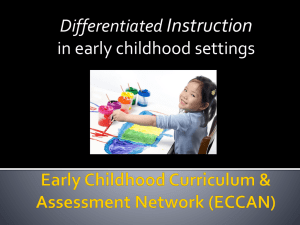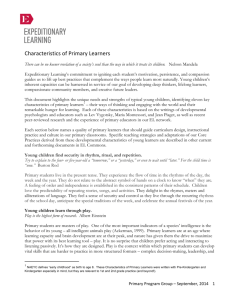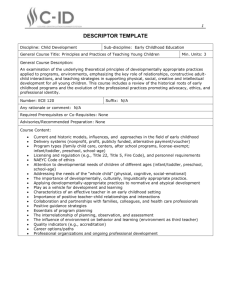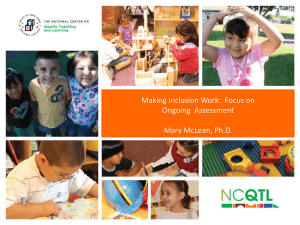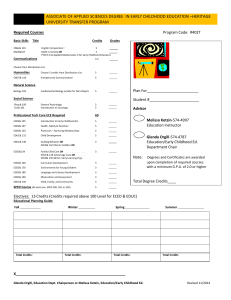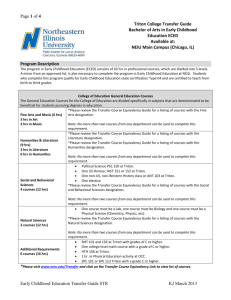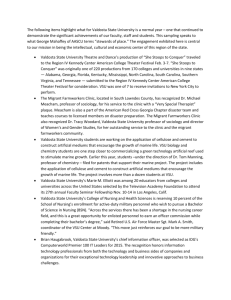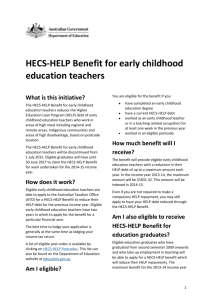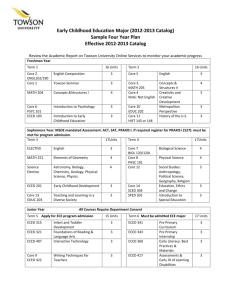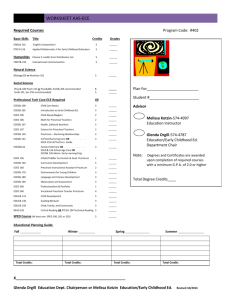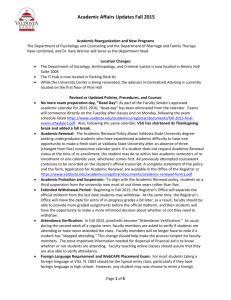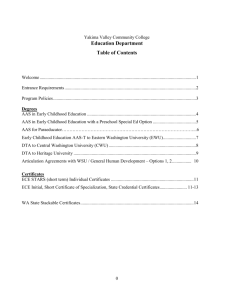ECED7220 - College of Education
advertisement
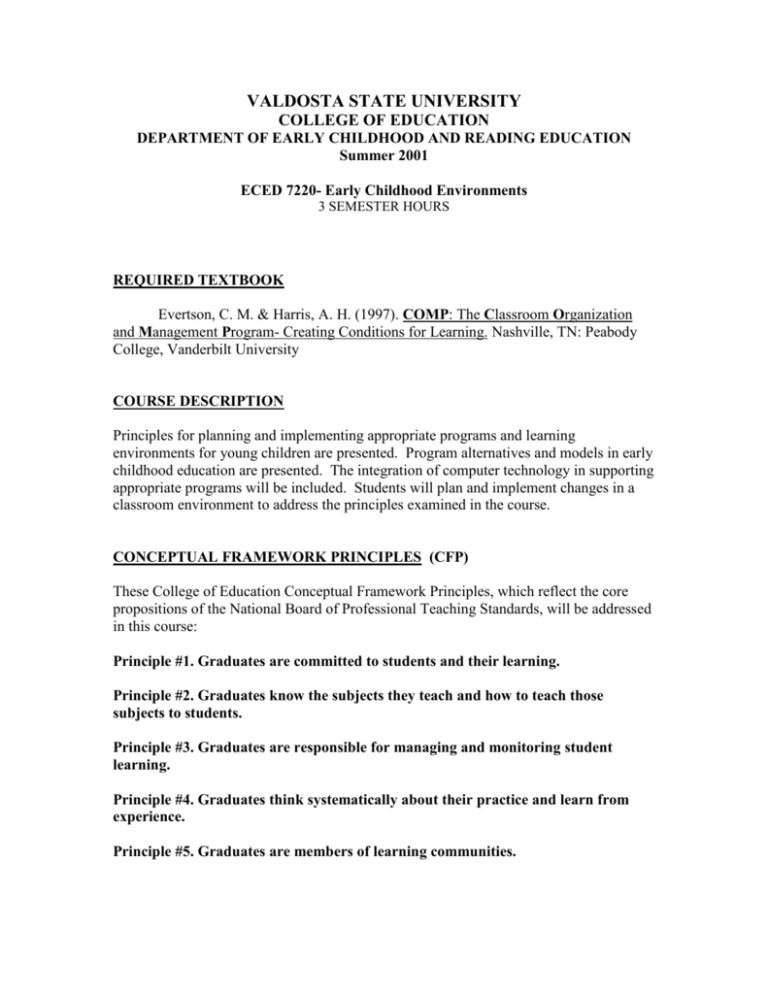
VALDOSTA STATE UNIVERSITY COLLEGE OF EDUCATION DEPARTMENT OF EARLY CHILDHOOD AND READING EDUCATION Summer 2001 ECED 7220- Early Childhood Environments 3 SEMESTER HOURS REQUIRED TEXTBOOK Evertson, C. M. & Harris, A. H. (1997). COMP: The Classroom Organization and Management Program- Creating Conditions for Learning. Nashville, TN: Peabody College, Vanderbilt University COURSE DESCRIPTION Principles for planning and implementing appropriate programs and learning environments for young children are presented. Program alternatives and models in early childhood education are presented. The integration of computer technology in supporting appropriate programs will be included. Students will plan and implement changes in a classroom environment to address the principles examined in the course. CONCEPTUAL FRAMEWORK PRINCIPLES (CFP) These College of Education Conceptual Framework Principles, which reflect the core propositions of the National Board of Professional Teaching Standards, will be addressed in this course: Principle #1. Graduates are committed to students and their learning. Principle #2. Graduates know the subjects they teach and how to teach those subjects to students. Principle #3. Graduates are responsible for managing and monitoring student learning. Principle #4. Graduates think systematically about their practice and learn from experience. Principle #5. Graduates are members of learning communities. COURSE OBJECTIVES (CO) Upon completion of this course, the student will: 1. Understand and implement principles for modifying early childhood classroom environments and programs to address the social, emotional, physical, and cultural needs, as well as the intellectual needs, of young children. (CPF 1,2,3,4,5) 2. Assess educational environments for their appropriateness for the effective development of young children. (CFP 1,2,3,4) 3. Work collaboratively to evaluate, plan changes, and implement changes in an early childhood environment. (CFP 3,4,5) 4. Consider the family as a significant influencing agent for the design and implementation of appropriate, effective learning environments for young children. (CFP 1,2,3,4,5) Proposed COURSE ACTIVITIES/ ASSIGNMENTS/ REQUIREMENTS 1. Classroom Environment Evaluation. Students will complete and submit a written environmental evaluation of their existing classroom environment, a scale drawing of the existing classroom, and 12+ accompanying photos to provide visual support for the text. The evaluation will examine the environment’s appropriateness for meeting the intellectual, social, emotional, physical, and cultural needs of the learners and the environment’s current visibility, accessibility, and distractibility concerns. Special emphasis will be placed on the classroom environment’s ability to address the varying ages, developmental levels, special needs, and cultural backgrounds of the learners. Based on the evaluation, recommendations for environmental changes will be proposed. (CO1, 2, 4) 2. Classroom Modification. a. Each student will discuss the results of his/her Classroom Environment Evaluation with another student enrolled in ECED 7220. b. Each student will select and address at least three of the recommendations made in his/her Classroom Environment Evaluation from those related to the environment’s appropriateness for meeting the intellectual, social, emotional, physical, and cultural needs of the learners. c. Each student will also modify her/his classroom environment to correct all the problems s/he identified related to visibility, accessibility, and distractibility. In addition to actual, physical changes in the classroom environment, documentation and assessment of the modifications will be completed. A second scale drawing and a second set of 12+ photos will be submitted to accompany the written report. The report must contain (a) a description of the learners who use the environment, (b) a thorough environmental evaluation, (c) objectives for the modifications, (d) a description of the analysis and implementation processes, and (e) an assessment of the final outcome. (CO 1,2,3,4) 3. Graphic Organizers. Students will plan, develop, and create three (3) graphic organizers related to classroom procedures, suitable for posting in an early childhood classroom. These will be shared during class time. (CO 1,3) 4. Student Accountability Matrices. Students will plan, develop, and create two (2) evaluation matrices to assist students in an early childhood classroom understand and evaluate how a grade was assigned to a specific assignment or calculated for a week’s or grading period’s end. These will be shared during class time. (CO 1,2) 5. Parent’s Checklist. Students will evaluate and modify a Parent’s Checklist to make it classroom-specific and appropriate for their use. (CO 1,4) 6. Family Plan. Students will reflect on the characteristics of the families represented by the children in their school or classroom setting. A plan for accommodating family and cultural influences in the learning environment will be developed. The plan may focus on family configurations, cultural backgrounds, and/or family needs as elements that influence the learners in the classroom. A copy of the plan will be submitted. (CO 1, 4) Changes in Course Content As the instructor of this course, I reserve the right to add or delete educational experiences, assignments, activities, requirements, and/or topics listed in the syllabus depending on the progress and ability of the students in this course. Changes to the syllabus will be provided verbally and in writing. COURSE EVALUATION Classroom Environment Evaluation Classroom Modification Graphic Organizers Student Accountability Matrices Parent’s Checklist Family Plan Pop quizzes 35 points 65 points 30 points 15 points 10 points 30 points 15 points Grading Scale Professional ethics, behavior, and quality are expected in all products and performances. Given the percentage totals below, final grades will be assigned accordingly. 200 – 181 = A 180 – 161 = B 160 – 141 = C 140 – 121 = D 120 – 000 = F INSTRUCTOR Mary Ellen Dallman, Ed.D. Email: medallma@valdosta.edu Phone: (229) 333-5929 (ECRE Office) (229) 333-5628 (direct line and voice mail) (229) 241-1733 (home) Fax: (229) 333-7167 Office: Education Center- Room 167 Office Hours: On-campus- Tuesday / Thursday: 1:00 – 2:15 p.m. Bainbridge- Monday: before and/or after class Additional hours are available by appointment. ATTENDANCE POLICY The attendance policy as stated in the current VSU Bulletin will apply. As per the VSU policy, a student who misses more than 20% of the class work of this course is subject to receive a failing grade in the course. Arriving more than 5 minutes late or leaving more than five minutes before the end of class is considered a tardy. Three tardies equal one absence. Ten points will be deducted from the final course grade for each absence. SPECIAL NEEDS STATEMENT Students requiring classroom accommodations or modifications because of a documented disability should discuss this need with the professor at the beginning of the semester. Students not registered with the Special Services Program should contact the Special Services Office in Nevins Hall, room 1115. The phone number is (229) 245-2498.


